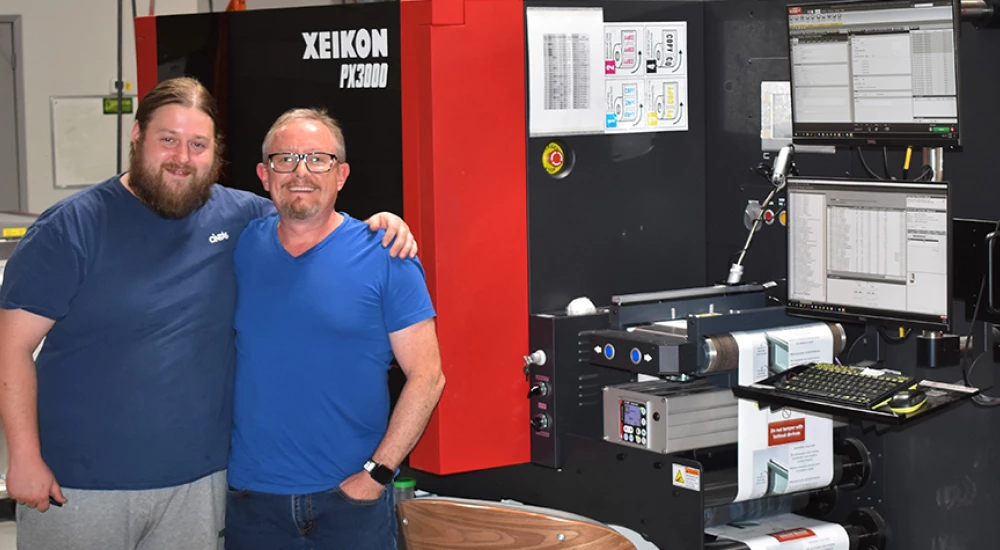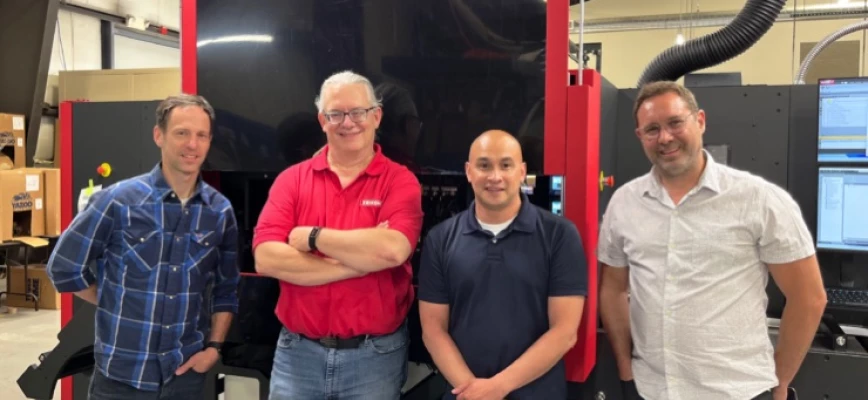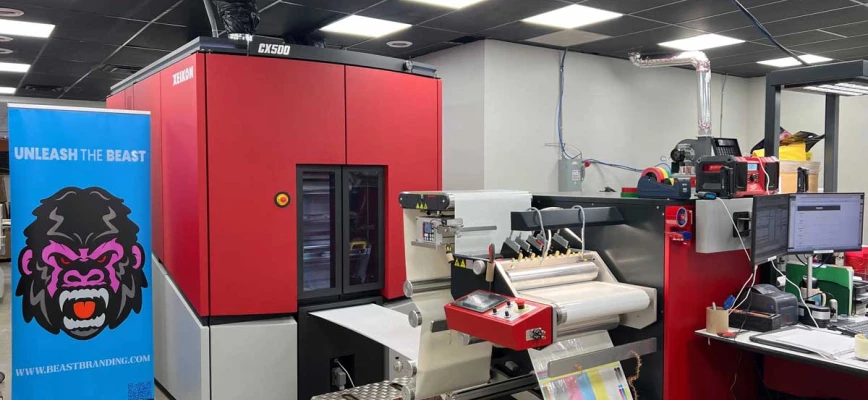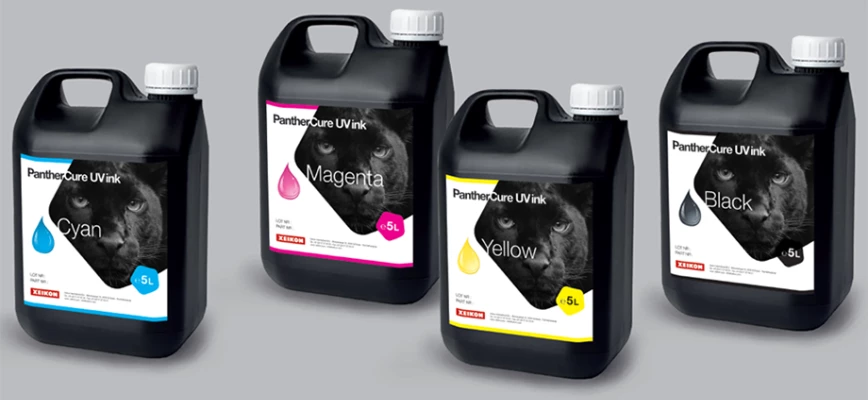22/07/2020
by Donna Covannon
Combining technologies
Before he started Premier Markings, Gary Moody gained over 20 years of experience as a label salesperson. He sold labels from his office; production of labels was done by other companies. Premier Markings started in 2008. It started as a digital printing company and that was a deliberate choice. With his expertise, and with the trends in the market of labels, industry veteran Gary realized that if he were to start his manufacturing capability it had to be with digital printing. There was no place for a flexo press in the concept of Gary’s Premier Markings. The company started with a low volume tabletop label printer, ideal for very short run labels of 500 pieces. Soon it became clear that a productive high-quality printing label press was needed to make the company a success. After researching the supplier market thoroughly, Premier Markings decided to buy a Xeikon 3030 in 2013. Gary comments: “Originally I was going to go for an HP labels press, but when I went to visit the Xeikon office in Chicago, the people there convinced me and gave me the sense that they would help me make it happen. Looking back now they really did!”
From start-up to a reference in digital labels
As a small company and a purely digital shop, Premier Markings was able to adapt faster to the changing trends in the market for labels. This gave the company as a newcomer an edge over existing, bigger, flexo-oriented label printers. Gary made another very specific and smart decision: he opted to hire IT people for his company rather than label savvy people. Gary: “Employees that can work with and understand computers easily are crucial for companies these days. This is even more so for digital label printing companies and I was convinced it was easier to train IT people about labels than the other way around. I’m absolutely sure that helped us a lot.”
After a learning curve, demand requests and accelerating productivity measures, Premier Markings realized they needed a second press. This would make them more productive because they would avoid many substrates changes on the press. A second Xeikon 3030 came in. Soon even those presses were nearing capacity so one of the Xeikon 3030 presses was upgraded to a Xeikon 3300, which basically doubled its capacity. Gary further noted, “That is very unique with the Xeikon dry toner series of presses, you can start with an entry-level press and then upgrade on-site when the business grows and you have extra funds to invest.”
The introduction of UV Inkjet
In January 2020, the Xeikon PX3000 UV inkjet machine replaced the Xeikon 3030. Gary was considering buying an inkjet press for 2 years. The speed of inkjet was appealing, and the print quality was better than he expected. Gary: “It was a tough decision to choose what type of inkjet press to go for as there are alternatives to the Panther (PX3000) from Xeikon. Eventually, an impressive demo at the Xeikon Chicago Innovation Center as well as knowing the certainty of having the very reliable Xeikon team at hand made the difference, and we opted for the Xeikon PX3000. Furthermore, the fact that the PX3000 uses the Xeikon X-800 as digital front-end was a big factor too. It is an invaluable tool in our business to make the most of digital printing and the fact that all our presses are driven by that same front-end is a big advantage. So today Premier Markings is running a Xeikon 3300 and a Xeikon PX3000.”
UV inkjet versus dry toner electro photography
Originally, Gary thought that inkjet was the future for everything, but Premier Markings learned it is not that simple. Both dry toner and UV inkjet have their benefits. Yes, dry toner has benefits in terms of food-safe toner compliance and UV inkjet labels are very durable, but Premier Markings points at other aspects too. Gary compares the presses as follows: the dry toner press is a very consistent machine, but it requires more maintenance. The inkjet press needs less maintenance but is more vulnerable. The labels look different and each technology has its forte in terms of printing quality. So how to decide what job to print on UV inkjet and what job to print on dry toner electrophotography (EP)? First, there is the label stock factor. Some substrates only work properly on dry toner, like estate or wine label stock, stock that has a structured surface. Matte BOPP is another substrate which Premier Markings only runs on dry toner. Other substrates simply work better on inkjet, for instance chrome substrates based on PP. Apart from these considerations, longer runs go on the Panther. Then, if the UV inkjet press still has excess capacity, all other jobs that can be printed well on the Panther will be printed on UV inkjet.
Why customers buy labels from Premier Markings
Premier markings has a website to promote their business, but most of their customers come to them via word of mouth. Premier Markings prints a whole range of different labels. Over the years they’ve become the Go-To Site in the Toronto-area for craft beer labels. They print a lot of nutraceutical labels and labels for the cannabis industry. Lately, due to COVID-19, a lot of hand sanitizer labels were printed. Labels are sold to customers without actively making the distinction between UV inkjet or EP. The substrate the labels need to be printed on and the production planning basically defines what press a label is printed. Finishing is being done offline on GM equipment Finishing is done offline on a Xeikon solution. Many of the jobs produced are matte laminated, even the UV inkjet labels. Gary: “Over the years we have constantly grown double-digit on a yearly basis. In the first years, we grew over 30% a year. Our business model is delivering a service that our customers need, we listen to and deliver what our customers require, most labels are delivered in 2 to 3 working days.”
Gary mentions the variety of labels he produces: ”A typical digital job is rotating warning labels; a product that has different warning messages or pictures. Different pieces of the same product on the shelf need to show different warnings. I don’t see how you could possibly print that on a flexo press. Another job example Gary notes: “200,000 peanut butter jar labels 2x9 inch on the Xeikon 3300; We ran a job of 1,000,000 labels on the Panther. My flex printer colleague could not realize this job in 3 days, so we did it on the UV inkjet press. Two years ago, this flexo label printer produced more labels for us than Premier Markings printed for his customers. Last year that changed. He knocks on our door to print jobs digitally quite frequently, while we need his flexo capability less and less. This evolution will only continue in the years to come.” We have the flexibility to run all sorts of labels in different quantities in much less time.
Successful in label printing
Premier Markings is a prime example of a shop being very successful in label printing by being agile, innovative and knowing when the trends shift - doing it the right way. It is a purely digital label printing shop with 11 employees. Since its start, the company has experienced double-digit growth every year. It perfectly combines dry toner EP technology and UV inkjet technology. Gary: “Premier Markings is very happy with Xeikon. Our business is very profitable and thanks in part to Xeikon and its team.”



